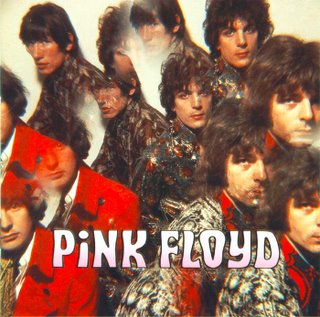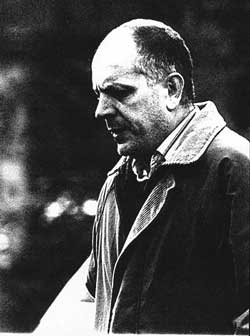
Largely thanks to the remarkable talents of Syd Barrett falling dormant to rampant hallucinogenic abuse (which in turn triggered a crippling bout of schizophrenia) almost before I was born, this feels kind of like writing an obituary about 35 years too late, but here goes ...
The music of Syd Barrett, for years, remained the one and only part of the history of Pink Floyd that I never "got." While I now regard 1967's The Piper At The Gates Of Dawn as a true psychedelic classic on a par with Sgt. Pepper's Lonely Hearts Club Band, my first impressions when hearing this record in late 1987 were more bemused than amazed as it sounded absolutely nothing at all like the Pink Floyd I had been obsessed with for months. Instead of the large scaled (and sour-eyed) ruminations on the human condition common to Roger Waters, Barrett's Pink Floyd dealt with house cats, rascally transvestites, simple love songs, fanciful gnomes, and passages from the I Ching. At times almost mincingly fey (I hate to admit that I often thought of Spinal Tap's "Listen To The Flower People"), at other times bordering on semi-chaotic, Piper struck me as more akin to The Monkees on acid than anything as fascinating as, say, The Dark Side Of The Moon.

Over the years, however, sporadic airings of that album (or the wonderful period singles as "Arnold Layne" and "See Emily Play" on sundry Floyd compilation albums) gradually brought me around on Barrett's unique and indisputable talent ... at least in regards to the music of Pink Floyd. Following that qualifier, I regret to add that, thus far, the appeal of much of his solo work continues to elude me: most of it I find far too raw and harrowing to be truly "enjoyable." That said, amongst all of his fractured missives from the other side of sanity, there are a few odd diamonds-in-the-rough that have gradually wormed their way into my subconscious like "Octopus," "Dominoes," "Golden Hair," and the nursery rhyme-like "Effervescing Elephant."
Since, like so many others my age, I discovered Pink Floyd by working backwards from their mid-1970s peak, it took me a few extra years to fully appreciate the band's evolution. Therefore, nearly all of what I'd learned about the band's formative years was gleaned from an supply of books and articles on the band I'd collected over the last two decades. While I'd slowly started to grow an appreciation for the sunny innocence of his work on its own merits, my respect for Barrett's time in the band also increased exponentially as I became more familiar with Pink Floyd's history and gradually came to realize just how much of a shadow that Syd's short-lived brilliance cast over music that came years, even decades later.
Pink Floyd, as I would discover, could not have existed after 1967 with Syd Barrett in the lineup, yet of course they also couldn't have existed without him: for in the beginning, it was all his baby. Roger Waters may have become the band's second frontman and through sheer force of will a couple of years down the road, but in the beginning Syd's natural charisma made him a natural (and magnetic) focal point on stage, at least until his psychological meltdown began to manifest itself on the eve of the band's U.S. tour (which, unsurprisingly, quickly became an unmitigated disaster). When Barrett's exasperated bandmates had finally had enough of his unpredictable behavior in early 1968 and bounced him from the lineup, it seemed to me like a simple pragmatic survival move (as if the band's attitude had been "Jesus, get this nutcase out of the band, already ... we need to get cracking on Dark Side Of The Moon!"), but I came to realize just how dangerous and risky this move was in retrospect. Imagine The Rolling Stones sans Mick Jagger, U2 minus Bono or The Smiths minus Morrissey and this is exactly the kind of place Pink Floyd found themselves in the spring of 1968.
Instead of rising up and conquering the world immediately after losing whom I'd considered their fifth wheel, Pink Floyd initially floundered in Barrett's wake, nearly capsizing over the next few years as they flailed about madly in search of something, anything, to keep the band solvent and relevant. Of course, against impossible odds, that did eventually come to pass. Interestingly, in his role as the band's chief lyricist, Waters seemingly could not avoid invoking Barrett (passingly or otherwise) in song as the band's profile grew. From what may or may not have been an offhand mention in the couplet Fearlessly the idiot faced the crowd / Smiling on 1971's Meddle, to the entirety of the song "Brain Damage" on The Dark Side Of The Moon, Barrett seemed to be lurking around in the back of the band's consciousness.
 That "lurking about" flowered into a tribute album of sorts with 1975's Wish You Were Here, an album that many (including myself) consider the peak of the band's output. Unlike in past Pink Floyd albums, Wish You Were Here addressed Barrett in no uncertain terms throughout, in tones ranging from aching ("Shine On You Crazy Diamond") and sarcastic ("Have A Cigar") to resigned ("Welcome To The Machine" and the ubiquitous title cut). It's also fair to assume that memories of the ex-Floyd leader's mental collapse were referenced at various points during 1979's The Wall as well (certainly moreso during the 1982 movie), particularly during the track "Nobody Home."
That "lurking about" flowered into a tribute album of sorts with 1975's Wish You Were Here, an album that many (including myself) consider the peak of the band's output. Unlike in past Pink Floyd albums, Wish You Were Here addressed Barrett in no uncertain terms throughout, in tones ranging from aching ("Shine On You Crazy Diamond") and sarcastic ("Have A Cigar") to resigned ("Welcome To The Machine" and the ubiquitous title cut). It's also fair to assume that memories of the ex-Floyd leader's mental collapse were referenced at various points during 1979's The Wall as well (certainly moreso during the 1982 movie), particularly during the track "Nobody Home."Since then, it's nearly impossible to attend any Pink Floyd-related show without seeing or hearing at least one reference to Barrett. The David Gilmour-led lineup of Pink Floyd performed "Astronomy Domine" on their 1994 tour (you can see the 1994 version here) and screened an affecting, allegorical film during performances of "Shine On You Crazy Diamond," while Roger Waters screened the whimsical videoclip for "Arnold Layne" during his 1987 outings, and later showed slides from the film during his more recent excusions. Gilmour's recent solo tour also featured "Arnold Layne" (one night in London even featured special guest David Bowie on vocals, which can be seen here), as well as the solo Barrett track "Dominoes."
It's a shame that, for many people, Barrett's work and the shadow he cast over some of the most popular rock music in history remains nearly unknown, while tales of his erratic touring behavior (and Herculean drug intake) are legion. There is an old cliche that reads "the flame that burns twice as bright lasts half as long," and for a very short time, Barrett's flame was as bright as a magnesium flare. His was a vital, fragile, and totally original talent ... you know, the kind we just don't see too often anymore.
For a far more entertaining (and coherent) look at the life and music of Syd Barrett, I highly recommend USD's The Pink Floyd & Syd Barrett Story DVD, and you could do a lot worse than to check out Pink Floyd's classic debut album The Piper At The Gates Of Dawn or the Syd Barrett solo collection Wouldn't You Miss Me: The Best Of Syd Barrett.

No comments:
Post a Comment